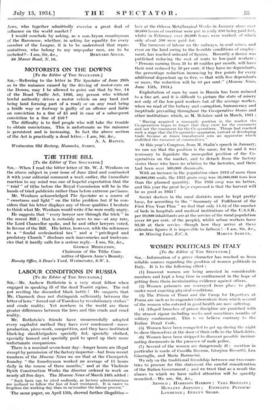LABOUR CONDITIONS IN RUSSIA
[To the Editor of TILE SPECTATOR.] SIR,—Mr. Andrew Rothstein is a very stout fellow when engaged in speaking ill of the dead Tsarist regime. The red pot reviling the discarded black kettle ! He suspects that Mr. Charnock does not distinguish sufficiently between the letter of laws " forced out of Tsardom by revolutionary strikes" and crude reality. Yet nowhere in the world are there greater differences between the laws and this crude and cruel reality.
Mr. Rothstein's friends have unsuccessfully adopted every capitalist method they have ever condemned—mass- production, piece-work, competition, and they have instituted black-leg shockbrigaders specially fed, specially clothed, specially housed and specially paid to speed up their more unfortunate companions.
There is a nominal seven-hour day—longer hours are illegal except by permission of the factory inspector—but from recent numbers of the Moscow News we see that at the Cherepetek foundry " the foundrymen worked an average of 15 hours daily in the course of three months," and at the Vladimir Ilyieh Construction Works the director ordered to work on nearly all free days. The Moscow News of March 24th added :
" Such facts can be cited endlessly, as factory administrations are inclined to follow the line of least resistance. It is easier to lengthen the working day than to rationalize the labour process."
The same paper, on April 15th, showed further illegalities— how at the Odessa Metallurgical NVorks in January alone over 30,000 hours of overtime were put in (only 890 being paid for), whilst in February over 20,000 hours were worked, of which only about 590 were paid for.
The turnover of labour on the railways, in coal mines, and even on the land owing to the-horrible conditions of employ- ment, has reached unheard of figures. Recently a decree was published reducing the cost of rents to low-paid workers : " Persons earning from 31 to 40 roubles per month, will have their rent reduced by 50 per cent. if they have no dependants, the percentage reduction increasing by five points for every additional dependant up to five, so that with five dependants or more, the reduction will be 80 per cent." (Moscow News,
June 15th, 1934.)
Exploitation of man by man in Russia has been reduced to a fine art, and it is difficult to picture the state of misery not only of the low-paid workers but of the average worker,
when we read of the bribery and corruption, bureaucracy and ineptitude prevailing throughout the Co-operative Stores and other institutions which, as M. Molotov said in March, 1931 :
" Having acquired a monopoly position in the market the Co-operatives began to forget that they exist for the consumers and not the consumers for the Co-operatives. Things had reached such a stage that the Co-operative apparatus, instead of developing trade -became at times transformed into an apparatus which stultified the turnover of commodities."
At this year's Congress, from M. Stalin's speech in January, we can see that the position is the same, for he said it was necessary to liquidate the monopolist position of the Co- operatives on the market, and to detach from the factory stores those who have no relation to the factories, and there had been over 500,000 dismissals.
With an increase in the population since 1913 of more than 30,000,000 souls, the 1932 grain crop was 36,000,000 tons less than the planned quantity. The 1933 crop was no better, and this year the great ho2e expressed is that the harvest will be as good as 1933!
Soviet doctors in the rural districts must be kept pretty busy, for according to the " Summary of Fulfilment of the First Five Year Plan " we find that only 14.12 of the number of beds in hospitals and medical institutions of the U.S.S.R. per 10,000 inhabitants are at the service of the rural population (over 80 per cent. of the people), whilst urban workers have 93.30 at their service—though how they arrive at these ridiculous figures it is impossible to fathom !—I am, Sir, &c.,






































 Previous page
Previous page